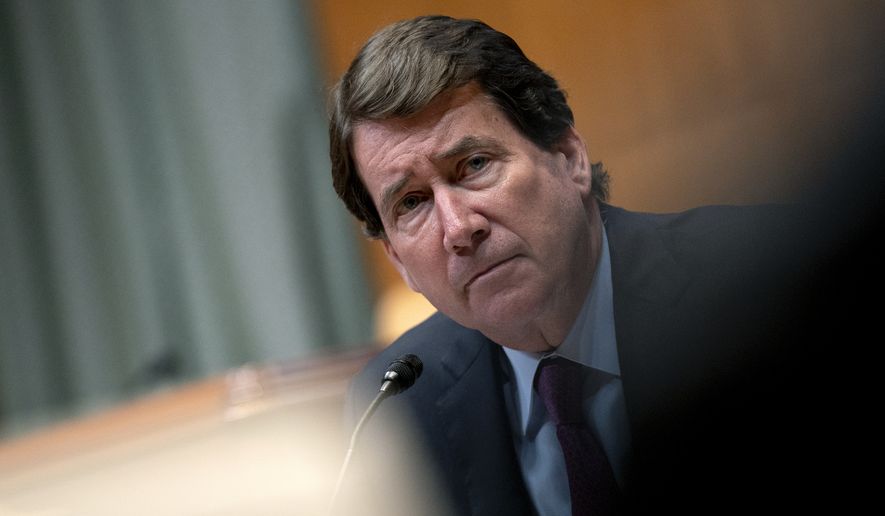The U.S. commitment to its allies in the Pacific is critical as China and North Korea step up provocations in the region, said a key member of the Senate Foreign Relations Committee who recently led a bipartisan delegation to Japan.
Sen. Bill Hagerty, who previously served as ambassador to Japan, said as the U.S. still recovers from the bungled withdrawal from Afghanistan, and as the world watches the war in Ukraine unfold, key U.S. allies across the globe are eyeing America’s resolve closely.
“They’re very watchful about what’s happening in Ukraine right now,” the Tennessee Republican said in an interview. “I think they’ve all been just shocked after the fall of Afghanistan, which extremely concerned our allies around the world. And I think there’s a great concern that Ukraine is going to divert attention from their part of the world.”
Mr. Hagerty was joined last week by Sens. Benjamin L. Cardin, Maryland Democrat, and John Cornyn, Texas Republican, in a series of in-depth discussions with the Japanese government and business leaders, including with Japan’s Prime Minister Fumio Kishida.
“We were there to underscore the fact that indeed, that’s not the case,” Mr. Hagerty told The Washington Times. “We understand the critical strategic significance that Japan plays. The role of China in the world is not benign, and we were there to underscore the importance of the relationship.”
Mr. Hagerty said that like the U.S., Japan has stepped up to send aid to Kyiv, and its leaders remain hopeful that a strategic failure by Russia in Ukraine will send a strong message to China. But he said Japan has not lost sight of the overarching threat posed by China.
“China has continued to occupy areas in the East China Sea, including the Senkaku Islands which are administered by the Japanese, in a very harassing way,” he said. “The Chinese have gone in and crushed coral reefs, poured millions of tons of concrete into the ocean to build artificial islands all along the South China Sea, which is one of the busiest trade routes in the world.”
“China’s posture at every turn is offensive,” he said.
North Korea, too, has stepped up provocations in Japan’s backyard, including multiple ballistic missile tests in recent weeks. On Sunday, North Korea completed its 13th weapons test this year, with the test-fire of a newly developed tactical guided weapon designed to expand its nuclear capabilities.
Amid the increasing provocations in the Pacific in tandem with the ongoing war in Ukraine, Mr. Hagerty said it is important for the U.S. to be capable of acting on multiple fronts.
“We have to be very careful that we don’t get wrapped around the axle in Ukraine, and we don’t lose sight of the threats that we face on a global basis, whether they be from China, North Korea or parts of the Middle East,” he said. “The United States has got to be agile and capable of acting on multiple fronts.”
And the U.S. focus on responding to the emerging crises worldwide should extend well beyond America simply maintaining a robust military posture, he said.
Mr. Hagerty said a key topic of discussion throughout the six-day delegation was the importance of sound energy policy in the U.S., which he stressed is critical to national security.
“The Japanese have seen what’s happening with our domestic energy policy,” he said. “They’re very concerned about our inability to export, and they’re even more imminently concerned right now because of the European dependence on Russian [liquified natural gas].”
Mr. Hagerty has been among the chorus of Republican lawmakers urging the White House to boost domestic energy production to dampen Russian influence over global markets and secure America’s energy independence.
The U.S. has banned Russian oil imports in response to the Kremlin’s assault on Ukraine and has called on the other countries to curb their dependence on Russian energy.
Last month, President Biden and European Commission President Ursula von Der Leyen pledged to “address the immediate energy security needs of the E.U. and accelerate the clean energy transition.”
As part of the pledge, the E.U. plans to phase out Russian energy imports before the end of the decade.
The E.U., which currently imports 40% of its total natural gas from Russia, has called on the U.S. to help overcome dependency by boosting shipments of liquified natural gas (LNG).
Mr. Hagerty said that without increasing output, a potential diversion of U.S. energy to Europe as European countries cut imports from Russia could place Japan, a country with no indigenous energy source, in an even worse situation.
“There are great areas of opportunity if we would rethink our energy posture, and they made that point very clear to me,” he said. “They’d like to see a renewed focus on our energy strategy that takes into account national security.”
“I think what we have to do is demonstrate American resolve,” he said.
• Joseph Clark can be reached at jclark@washingtontimes.com.




Please read our comment policy before commenting.